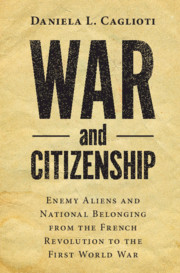 War and Citizenship
War and Citizenship Book contents
- War and Citizenship
- Human Rights in History
- War and Citizenship
- Copyright page
- Dedication
- Contents
- Table
- Acknowledgments
- Note on Translation
- Abbreviations
- Introduction
- Part I Background
- 1 The Emergence of the Enemy Alien
- 2 Enemy Aliens and “Civilization” in Warfare
- 3 Citizens and Aliens in Peacetime
- Part II The First World War
- Part III Aftermath
- Endnotes
- Works Cited
- Index
3 - Citizens and Aliens in Peacetime
from Part I - Background
Published online by Cambridge University Press: 30 October 2020
- War and Citizenship
- Human Rights in History
- War and Citizenship
- Copyright page
- Dedication
- Contents
- Table
- Acknowledgments
- Note on Translation
- Abbreviations
- Introduction
- Part I Background
- 1 The Emergence of the Enemy Alien
- 2 Enemy Aliens and “Civilization” in Warfare
- 3 Citizens and Aliens in Peacetime
- Part II The First World War
- Part III Aftermath
- Endnotes
- Works Cited
- Index
Summary
This chapter examines official attitudes toward aliens in peacetime during the nineteenth century by focusing first of all on their rights in a period characterized by sovereignty, nation-building, solidification of borders and the issue and reform of citizenship laws on the one hand, and on the emergence of globalization, migration and the construction of an international society on the other. The chapter delves into the debates on the right of asylum, expulsion, expatriation, and examines early policies of migration control and the dilemma of reconciling rights and freedom of movement with emerging anti-alienism that precipitated into violence. The second part of the chapter concentrates on citizenship as a legal device, exploring first of all practices of collective acquisition of citizenship triggered by annexations of territories, creation of new nation-states, plebiscites and option regimes incorporated in international treaties. It then deals with individual acquisition and loss of citizenship (naturalization and denaturalization), paying particular attention to the gender dimension of citizenship, conscription, dual citizenship and the ethnic shift in citizenship practices and notions that began to emerge at the turn of the century.
Keywords
- Type
- Chapter
- Information
- War and CitizenshipEnemy Aliens and National Belonging from the French Revolution to the First World War, pp. 73 - 104Publisher: Cambridge University PressPrint publication year: 2020
